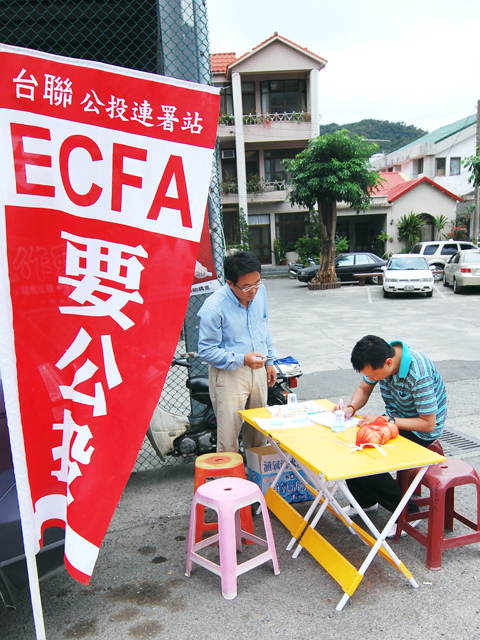Seeing a movie, traveling on public transportation or taking the train may have more in common than people think. That’s because all of these activities now involve infomercials on the government’s proposed economic cooperation framework agreement (ECFA) with China.
Government authorities have asked that electronic information displays in Taipei Main Station and trains operated by the Taiwan Railway Administration (TRA) run ECFA infomercials. Messages scrolling on the information displays include: “ECFA is to protect Taiwan and is a road to the rest of the world,” and “ECFA is to help people do business and increase Taiwan’s economic competitiveness.”

PHOTO: TSAI TSONG-HSIEN, TAIPEI TIMES
MOVIE THEATERS
Moviegoers heading to a theater to catch the latest movie will now also be treated to a minute-long commercial touting the benefits of the ECFA in between movie previews.
Speaking in a telephone interview with the Taipei Times yesterday, an official in charge of movie content at the Government Information Office said the Council of Labor Affairs had asked to insert a commercial called “Guarding the nation’s sovereignty” before all movies broadcast in theaters nationwide.
‘PUBLC SERVICE’
“The commercial is broadcast as part of a three-minute time span allocated for public messages,” said the official, who did not wish to be named. “Its purpose is to market the ECFA and it will be played until the end of April.”
A quick survey of commuters at Taipei Main Station found that many members of the public are strongly against the ads, with some saying that they see it as government intrusion in their everyday affairs.
“I have no problem with the ads appearing in banks, government offices and other places that are actually related to the ECFA. But in movie theaters, trains and even some hospitals? I think enough is enough,” said a middle-aged commuter surnamed Chen.
“During our train ride, we kept seeing the [ECFA ads] scroll in front of our faces … and it took away from actually useful information, like what the next stop was,” said an elderly woman surnamed Tsai, who had just alighted from a train from Yilan County.

CHANGING LANDSCAPE: Many of the part-time programs for educators were no longer needed, as many teachers obtain a graduate degree before joining the workforce, experts said Taiwanese universities this year canceled 86 programs, Ministry of Education data showed, with educators attributing the closures to the nation’s low birthrate as well as shifting trends. Fifty-three of the shuttered programs were part-time postgraduate degree programs, about 62 percent of the total, the most in the past five years, the data showed. National Taiwan Normal University (NTNU) discontinued the most part-time master’s programs, at 16: chemistry, life science, earth science, physics, fine arts, music, special education, health promotion and health education, educational psychology and counseling, education, design, Chinese as a second language, library and information sciences, mechatronics engineering, history, physical education

DEADLOCK: As the commission is unable to forum a quorum to review license renewal applications, the channel operators are not at fault and can air past their license date The National Communications Commission (NCC) yesterday said that the Public Television Service (PTS) and 36 other television and radio broadcasters could continue airing, despite the commission’s inability to meet a quorum to review their license renewal applications. The licenses of PTS and the other channels are set to expire between this month and June. The National Communications Commission Organization Act (國家通訊傳播委員會組織法) stipulates that the commission must meet the mandated quorum of four to hold a valid meeting. The seven-member commission currently has only three commissioners. “We have informed the channel operators of the progress we have made in reviewing their license renewal applications, and

The High Prosecutors’ Office yesterday withdrew an appeal against the acquittal of a former bank manager 22 years after his death, marking Taiwan’s first instance of prosecutors rendering posthumous justice to a wrongfully convicted defendant. Chu Ching-en (諸慶恩) — formerly a manager at the Taipei branch of BNP Paribas — was in 1999 accused by Weng Mao-chung (翁茂鍾), then-president of Chia Her Industrial Co, of forging a request for a fixed deposit of US$10 million by I-Hwa Industrial Co, a subsidiary of Chia Her, which was used as collateral. Chu was ruled not guilty in the first trial, but was found guilty

Taiwan People’s Party (TPP) Chairman Huang Kuo-chang (黃國昌) yesterday appealed to the authorities to release former Taipei mayor Ko Wen-je (柯文哲) from pretrial detention amid conflicting reports about his health. The TPP at a news conference on Thursday said that Ko should be released to a hospital for treatment, adding that he has blood in his urine and had spells of pain and nausea followed by vomiting over the past three months. Hsieh Yen-yau (謝炎堯), a retired professor of internal medicine and Ko’s former teacher, said that Ko’s symptoms aligned with gallstones, kidney inflammation and potentially dangerous heart conditions. Ko, charged with